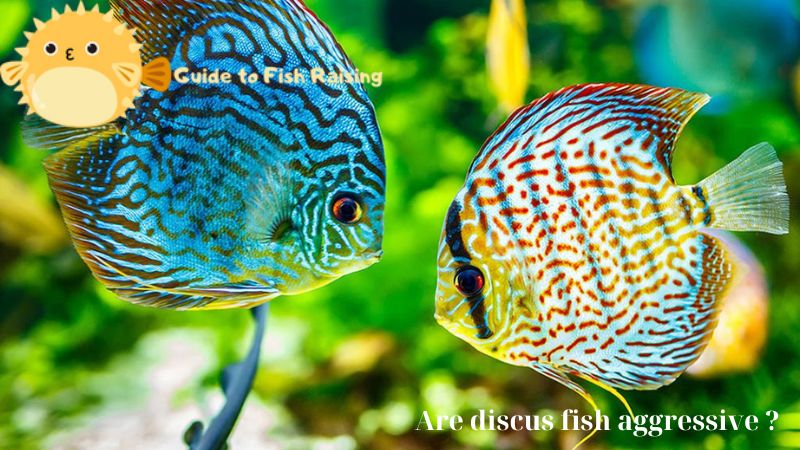Are discus fish aggressive? Discus fish, also known as discus fish, is one of the beautiful and rare ornamental fish species loved by many people. With their vibrant colors and unique shapes, they have become a symbol of elegance in the aquarium world. However, a question that is often asked is whether discus fish have an aggressive personality or not. Understanding the personality of this fish not only helps farmers take better care of them but also ensures harmony in the aquarium. Let’s explore with fishtankenthusiast.com that discus fish are aggressive and the factors that help reduce their aggressive behavior.
What kind of fish is discus fish?
Discus fish are members of the Cichlidae family and are sometimes called the “Kings of the Aquarium” because of their majestic beauty and gorgeous colors. At least three species have been described, although there is debate about the validity of some of the assigned scientific names. Wild-caught discus can be difficult to raise, due to water chemistry and their unique nutritional needs, however, most discus sold today are captive bred and are much easier to raise. However, they are not for beginners for many reasons. Through selective breeding, many color varieties are available and more continue to be developed. The information provided here can also be utilized to care for and maintain Uaru fish as well as wild-caught P. scalare and P. altum angelfish.
Natural habitat of discus fish
In the lowland Amazon River basin and several of its tributaries, such as the Rio Negro, discus can be found in floodplain lakes and woodlands. These areas experience extreme changes in water levels due to seasonal flooding. Discus fish tend to congregate near fallen trees, called “galhadas”, along the banks. They prefer calm waters and are rarely found in areas with strong currents or large waves.

Discus fish’s water needs
Discus fish prefer warm, soft, and acidic water. A pH of 6.0 to 7.0 and a hardness of 1° to 4° dKH (18 to 70 ppm) are the ideal ranges. The ideal temperature range for Heckel discus is between 82° and 86° F, while wild fish prefer water that is closer to 90° F. To keep the water at the right temperature, use an Aqueon aquarium heater. Although dechlorinated tap water can be used to maintain captive-bred discus, reverse osmosis or deionized water enhanced with Aqueon Water Renewal will yield optimal results. When buying discus fish, always ask about the chemical composition of the water in which they are raised. Discus fish need pure water quality and should do weekly water changes of 10% to 25% using an Aquarium Water Changer.
Are discus fish aggressive ?
Discus are usually calm, gentle fish, but as tilapia, they can be aggressive towards each other, especially when trying to pair up and reproduce. Shy or docile fish should be culled if they cannot compete. Most serious aquarists do not keep discus with too many other species. Some suitable tank mates include cardinal tetras, neon fish, emperor tetras and red nose tetras as well as clownfish and dwarf tilapia, such as rams and Apistogramma species. All of these fish can tolerate the high temperatures and low pH/hardness levels that discus fish need.
What do you need to do to reduce discus bullying?
Minimizes the mistreatment of discus fish during feeding
Now you have to be smarter than them. Distribute the food evenly throughout the tank rather than in one spot. Once you spread food throughout the tank, the largest discus fish in the tank cannot patrol the entire area, so everyone gets a chance to eat. If it decides to go to the left side of the tank and attack the food, the other discus fish will eat on the opposite side. If you just throw a lump of food into the tank, the king discus fish will guard it. It won’t even eat and it certainly won’t let any of the others eat either. So, plan accordingly and become a psychologist. Be in control during feeding time.
Change the environment to reduce discus bullying
Aggression can also occur during spawning times and when your tank is lacking fish. An example of a fish-deficient tank is a 30-gallon tank with only two discus fish. Naturally, one discus fish will bully the other. In that specific instance, the smaller discus will attack it all day because there is nowhere for it to run. But with three discus fish, the aggressive fish will try to chase both of them and exhaust itself. The same thing will happen in a larger tank. If you give a large discus fish too much space to patrol, it will only guard part of the tank and not chase the others constantly. Another strategy is to move furniture around your tank to break up the monotony and territoriality.
Add more fish to reduce discus bullying
Another solution is to add more discus fish to your tank. I don’t want you to overcrowd the tank, but having a number of discus of the same size will eliminate a lot of bullying. Sometimes a discus fish becomes so aggressive that you have no choice but to separate the fish. This will usually reset the pecking order and alleviate some of the bullying in the tank.
Conclusion
In short, discus fish are not aggressive fish, but they can show territorial defense behavior in certain situations. Raising discus fish requires careful understanding and care, from establishing a suitable habitat to choosing tank mates. Understanding the personality and needs of discus fish will help farmers create a safe and comfortable living environment for them. Thanks to proper care and patience, discus fish can become wonderful companions, bringing beauty and relaxation to any aquarium enthusiast.





